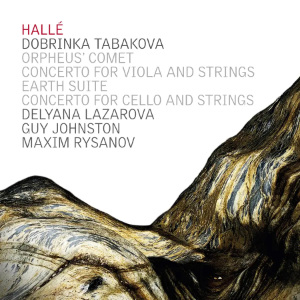
Dobrinka Tabakova (b. 1980)
Orpheus’ Comet (2017)
Concerto for Viola and Strings (2004)
Earth Suite (2018/2020)
Concerto for Cello and Strings (2008)
Maxim Rysanov (viola), Guy Johnston (cello)
The Hallé/Delyana Lazarova
rec. (live), 2022, Bridgewater Hall, Manchester & Hallé St Peter’s, Manchester, UK
Hallé CDHDL7562 [80]
Orpheus’ Comet, commissioned by the BBC and the European Broadcasting Union, was written for the 50th anniversary of the regular Music Exchanges. You may recall that the signature music of Euroradio was the opening of Monteverdi’s L’Orfeo. Unsurprisingly, that melody was at the heart of the work’s concept, the composer tells us. This overture in all but name begins with what she describes as “buzzing in the horns, gradually evolving into nebulous chord clusters”. All this suggests ambiguous mood, but it is quickly dispelled: around one minute in, the melody emerges without asserting itself right away. A solemn chorale slowly appears, soon to be surrounded by variants of the initial buzzing. From then on, the music unfolds, and gains considerable impetus through a powerful build-up. That leads to an assertive statement of the melody but “with a modern twist”, as Tabakova has it. All in all, this is an all-around fine concert opener.
The Viola Concerto was written for Maxim Rysanov, who studied at the Guildhall School of Music and Drama at the same time as Tabakova; another connection is that Rysanov had already played several of her pieces. This substantial work has three, or perhaps four, movements. The composer regards the first movement as an overture: many ideas which appear later in the Concerto are stated in the course of this movement.
The work opens confidently, and the soloist jumps straight into the action. The urgency of the beginning stays throughout the movement before reaching a demanding cadenza. The next movement, Passionate and nostalgic, is a song without words, “almost like a lullaby” as the composer says, but maybe too tense for a lullaby. Tension is dispelled in the dance-like movement Light, in which the soloist playfully dialogues over pizzicato strings. The music bridges without interruption into the movement that recapitulates earlier material and leads the piece to its conclusion. There are rather few viola concerti, so Tabakova’s works is a most welcome addition to the repertoire.
Earth Suite has (so far) three independent movements, which may be performed in any order, or even separately. Tectonic was written in 2018, Timber & Steel in 2019, Pacific in 2020. Tectonic appeared in a BBC Music Magazine cover CD, so it may be somewhat better known. In this substantial piece, Tabakova shows her remarkable orchestral flair and ability to build in long paragraphs. There are echoes of, say, John Adams or Michael Torke: suggestions to speed up by juxtaposing short, nervous phrases and longer melodies. (This, it seems to me, is a frequent trait in her music.)
Pacific is, understandably enough, slower, generally calmer and almost static at times. But just as the Ocean, the music may suddenly become more troubled or unstable, even if calm and utter peace prevail. Timber & Steel was written to celebrate the 150th birthday of Sir Henry Wood; the title clearly refers to his nickname. The music has a lot of energy. Wooden percussion and brass give the impetus to push the music forward.
The Concerto for Cello and Strings is in the fast-slow-fast pattern. The composer prefers to think of it as a whole, with little or no break between the three movements. Turbulent is a virtuosic affair, in which cello and strings are in constant dialogue. As in the Viola Concerto, there are folk-like echoes in the melodic material. Longing, the slow movement, offers a marked contrast. The material is slightly varied while preserving the basic lyrical strains of the music. Radiant resumes the mood of the opening, and unfold steadily towards the assured final resolution. This splendid work deserves wider exposure. It had been recorded on an ECM disc (review ~ review) which I have yet to hear, so I cannot compare the readings. In any case, Guy Johnston’s performance of this superb, demanding work is as assured and committed as one may hope for.
All in all, this is a great release on all counts, with committed readings and in good sound. One can hear that both soloists are attuned to the music. They play with impeccable technique and, one assumes, with deep understanding. The Hallé led by Delyana Lazarova give a remarkably assured and convincing support.
Hubert Culot
Help us financially by purchasing from




















